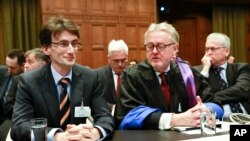Even before starting work as chairman of a U.N. human rights commission investigating the Gaza war, Canadian law professor William Schabas has been vilified as an apologist for Iran incapable of setting aside his perceived anti-Israel bias.
Full page adverts have been taken out against him in The New York Times, Wall Street Journal and Washington Post, while the Facebook page of Rabbi Shmuley Boteach, a leader of the anti-Schabas campaign, has attracted more than 30,000 “likes.”
The make-up of Schabas' commission is still being finalized - George Clooney's fiancee, Amal Alamuddin, turned down the invitation so another one or possibly two members must be found - but already he is worried about whether the team will be allowed to get into the region to conduct its inquiry.
“There is going to be an issue for the commission getting access, getting into Gaza and going to Israel,” he told Reuters in an interview, speaking from his home in England, where he is a professor of international law at Middlesex University.
“Other fact-finding bodies of this nature have had difficulty in the past,” he said. “I can't rule it out.”
In the meantime, Schabas finds himself defending comments he has made criticizing Israeli Prime Minister Benjamin Netanyahu, and explaining how he can set aside his personal feelings about the Middle East to carry out a balanced investigation.
“We all have views about Israel, Palestine and things that have gone on in the past and we all have to put those things to one side,” he said. “I'm determined to do that. The question is whether the person is capable of doing it. I think I'm capable of doing it and no one has any proof to the contrary.”
Heavy death toll
The month-long war against Hamas, with Israel carrying out airstrikes, artillery bombardments and ground operations in response to constant militant rocket fire and attacks via tunnels, left more than 2,000 Palestinians dead, most of them civilians, as well as 64 Israeli soldiers and three civilians.
It was the deadliest war in Gaza since Israel unilaterally withdrew from the territory in 2005 and included several incidents in which Israel was accused by rights groups of excessive use of force, war crimes or crimes against humanity.
For its part, Hamas fired rockets indiscriminately at Israeli towns and cities, was accused of using civilians as human shields and of carrying out attacks from next to hospitals, from ambulances and inside densely populated areas.
In two cases, U.N.-run schools being used as shelters were hit by Israeli artillery, killing 25 people, and in another incident four boys playing on a beach were killed by shell fire.
Israel said the area around the schools had been used to fire rockets - rockets were found at three empty U.N. schools - while describing the death of the boys as a “tragic outcome” in which Hamas fighters were the intended target.
Schabas would not be drawn on which events in the war would be most closely scrutinized, saying the commission had to be fully constituted first. But he made clear that the mandate was for a broad investigation, covering both sides.
Israel had already given “brief but nevertheless significant” explanations for some of its actions, he said. The aim would be to get more detail and clarity, from all parties.
“When we see young boys being killed on a beach, it may not be enough to say that we were acting in self-defense and we try to minimize civilian casualties,” he said. “We need more detail to understand.”
'Greatest threat'
From Rabbi Boteach's point of view, there is nothing Schabas can say that will make his investigation credible.
Having once described Netanyahu as “the greatest threat to Israel” and declared him his “favorite” to appear before the International Criminal Court, Schabas is, in the minds of most Israelis, unfit to serve as an independent investigator.
His part-sponsorship in 2011 of a human rights conference in Iran alongside an organization Boteach described as “fundamentalist and anti-Semitic” has enraged detractors.
“Someone like William Schabas, who has a proven record of bias, who has served as a fig-leaf and toadie for the Iranian regime, has no credibility to adjudicate any kind of human rights commission,” the U.S.-based rabbi said in an interview.
“If he had any decency he would recuse himself. He doesn't like Israel and he hates its prime minister.”
Netanyahu has not kept out of the fray either, saying that Schabas's inquiry has already been written.
“They have nothing to look for here. They should visit Damascus, Baghdad and Tripoli,” he said last week.
Part of the frustration for Israel is what it feels is an excessive focus on its every action, with past U.N. inquiries, most infamously the Goldstone Report into the 2008-9 Gaza war, focusing far more on Israel than any Hamas violations.
More than a year after his report was published, Judge Richard Goldstone separated himself from some of its findings, saying subsequent information provided by Israel had convinced him that some of the original conclusions were wrong.
Schabas said he hoped Israel, which refused to cooperate with Goldstone's inquiry, would not do the same this time.
“Goldstone essentially said 'if I had known then what I know now about certain issues, then the conclusion of my report would have been different,' ” said Schabas.
“That is a very compelling argument to encourage Israel to cooperate with this commission. If they think its fruitless or futile to cooperate, it's a good argument to bear in mind.”





